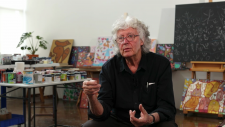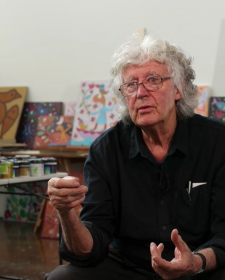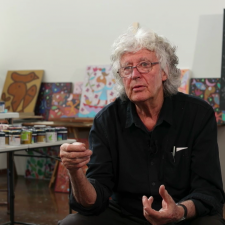- About us
- Support the Gallery
- Venue hire
- Publications
- Research library
- Organisation chart
- Employment
- Contact us
- Make a booking
- Onsite programs
- Online programs
- School visit information
- Learning resources
- Little Darlings
- Professional learning
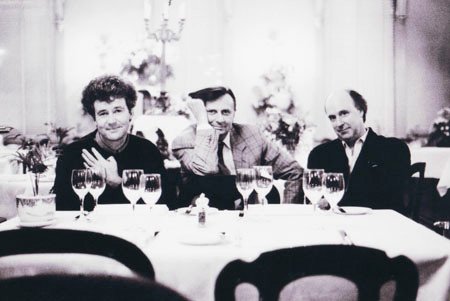
Barry Humphries AO CBE (1934–2023), actor, writer and artist, was the world's all-time most successful solo theatrical performer. Born in Melbourne, in the early 1950s he commenced studying Law at the University of Melbourne, where he became interested in Dadaism and began performing in revues. Abandoning his degree after two years, he joined the Melbourne Theatre Company and in 1954, while touring regional Victoria with a MTC production of Twelfth Night, he created a character named Edna inspired by the lady mayoresses and other municipal officials he encountered. Mrs (later Dame) Edna Everage made her stage debut in a sketch at Melbourne University’s Union Theatre in December 1955. He revived Edna for revues at Sydney’s Phillip Street Theatre in 1957 and after his return to Melbourne, Humphries created another of his archetypes of suburban mediocrity: the washed-out, ruminative Sandy Stone. In London from 1959, Humphries performed at Peter Cook’s legendary venue The Establishment, and became part of a cohort of comedians and satirists that included Cook, Dudley Moore, Spike Milligan and Alan Bennett. During the 1960s he appeared in several films, numerous West End stage productions and on BBC Television’s The Late Show. He also contributed to the satirical magazine Private Eye, for which he created a comic strip about an uber-boorish Australian bloke named Barry McKenzie. Back in Australia from 1970, Humphries co-wrote the feature film The Adventures of Barry McKenzie (1972), and premiered another of his best-known characters: the deeply offensive, lecherous ‘cultural attaché’ Les Patterson. Humphries many and varied film credits include roles in The Getting of Wisdom (1977), The Secret Policeman’s Other Ball (1982), Immortal Beloved (1994), Spice World (1997), and An Unexpected Journey (2012) – the first film in Peter Jackson’s three-part adaptation of Tolkien’s The Hobbit. In 2003 he was the voice of Bruce, the shark, in the animated film Finding Nemo. Throughout all this time, Humphries remained committed to his true calling and from the 1950s onwards performed his satirical one-man comedy shows in Australia, Britain, Europe and the USA. Edna Everage's wild vigour carried her through such triumphs as Housewife, Super-star; Edna, the Spectacle; Dame Edna, The Royal Tour; and Eat Pray Laugh!, which Humphries announced would be her last. Despite once claiming that he took up acting to entertain himself, Humphries’ contribution to his craft was honoured with many prestigious awards including a Mo Award (1989), a British Comedy Award for Lifetime Achievement (1999), a Special Tony Award (2000), the JC Williamson Award (2007), and an Outer Critics Circle Award (2000). Humphries’ was named an Officer of the Order of Australia in 1982, and in 2007 he was named a Commander of the British Empire for his services to entertainment. He was the subject of the National Portrait Gallery's first large-scale biographical exhibition in 2002, and the following year he gained an honorary doctorate – in Law – from the University of Melbourne. His many books include two different autobiographies, More Please (1992) and My Life as Me (2002) as well as an autobiography of Edna Everage, My Gorgeous Life (1997).
Cartoonist, poet and writer Michael Leunig (1945–2024), referred to as ‘Leunig’, was a regular contributor to The Age and the Sydney Morning Herald for 55 years. Born in East Melbourne, he studied briefly at Swinburne Film and Television School where his first cartoons appeared in the student newspaper. In the mid-1960s his work began to appear in publications such as Woman’s Day, London’s Oz magazine and the afternoon paper Newsday. He produced his first cartoon for The Age in 1969 and gained wider recognition in the 1970s with his work for the Nation Review. In his earliest work Leunig drew classic political cartoons; but in 1969, frustrated by the genre’s conventions, he submitted a surrealistic cartoon of a man wearing a teapot on his head riding into a sunset on a large duck. It was published, and Leunig would later come to see it as a symbolic depiction of his own escape from the strictures of political cartooning. His subsequent work – in which the duck has frequently reappeared, along with recurrent characters Mr Curly and Vasco Pyjama – has been published in 25 books of collected cartoons; exhibited in prints, paintings and drawings; and adapted for television, theatre and radio.John Clarke (1948-2017), satirist and humourist, moved to Australia in the 1970s from New Zealand, where he had begun performing in university revues and was named Entertainer of the Year in 1976. Within a few years he had become well known here in the persona of laconic farmer Fred Dagg. Dagg’s monologues aired six days a week for three years on the ABC. In 1981-1982 Clarke published The Fred Dagg Scripts and Daggshead Revisited, which soon sold over 20 000 copies. In March 1982, the year he was nominated for an AFI award for co-writing the Paul Cox film Lonely Hearts, Clarke and the ABC fell out over suitable topics for satire, but in 1984 Clarke resurfaced on the ABC in The Gillies Report, in which he presented deadpan reports on the fictional sport of farnarkeling. In 1989, 1990 and 1993 he co-wrote three ‘Royal Commissions’ with Ross Campbell. From 1989 to 1997 he appeared regularly with Bryan Dawe on A Current Affair, and in 1998 he returned to ABC screens in a hilarious mocumentary about the Sydney Olympics, The Games. In 2003 he wrote the screenplay adaptation of the Shane Maloney novel Stiff; in 2004, he wrote and appeared in the adaptation of The Brush-Off by the same author. He recently wrote, presented and co-produced the documentary series Sporting Nation. His interviews with Bryan Dawe spanning 25 years have been released on CD, DVD and in book form; he has published many other humorous books.
Gift of Helga Leunig 2013
© Helga Leunig
Barry Humphries (age 55 in 1989)
Michael Leunig (age 44 in 1989)
John Clarke (age 41 in 1989)
Helga Leunig (4 portraits)



On one level The Companion talks about the most famous and frontline Australians, but on another it tells us about ourselves.
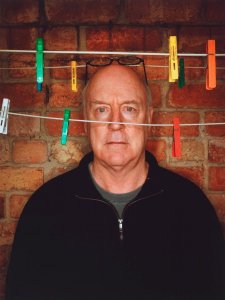
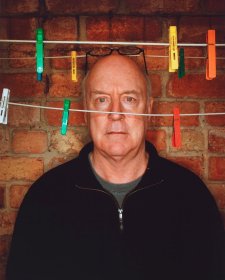
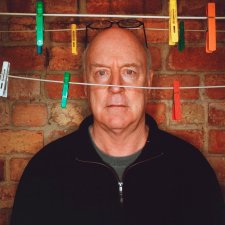
Angus Trumble pays tribute to John Clarke.
